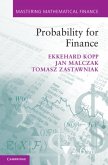The precautionary principle has been labeled simplistic and the rational approach to decision-making under risk was modeled on well-specified games of chance. How then are we to manage the risks, uncertainties, and 'unknown unknowns' of the real world? In this book, Alan Randall unravels the key controversies surrounding the precautionary principle and develops a new framework that can be taken seriously in policy and management circles. Respecting the complexity of the real world, he defines a justifiable role for the precautionary principle in a risk management framework that integrates precaution with elements of the standard risk management model. This is explained using examples from medicine, pharmacy, synthetic chemicals, nanotechnology, the environment and natural resources conservation. This carefully reasoned but highly accessible book will appeal to readers from a broad range of disciplines, including environmental policy, risk management and cost-benefit analysis.
Dieser Download kann aus rechtlichen Gründen nur mit Rechnungsadresse in A, B, BG, CY, CZ, D, DK, EW, E, FIN, F, GR, HR, H, IRL, I, LT, L, LR, M, NL, PL, P, R, S, SLO, SK ausgeliefert werden.









